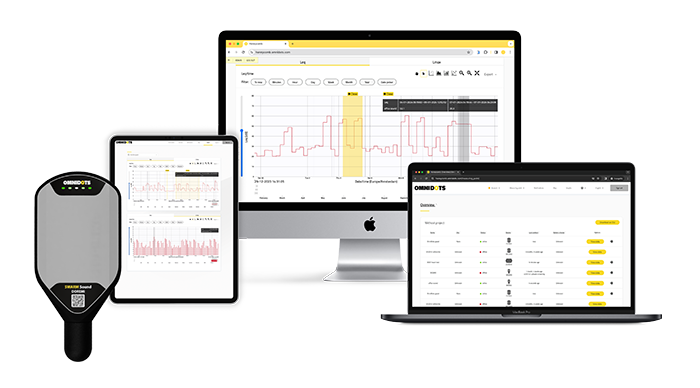Quick Start Guide | SWARM Sound

Parts list
-
SWARM Sound monitor
-
Power cable
-
Power adapter
-
Band clamp
-
Instructions prior to first use
INSTRUCTIONS PRIOR TO FIRST USE
Product innovations over the air
The first time you power up your SWARM Sound, the SWARM Sound will look for the latest product innovations to download. Within a few minutes the SWARM Sound is up-to-date and ready to use. Update status and download progress for the latest firmware can be viewed in the last contact column on your Honeycomb overview page. How to create a Honeycomb account is explained below under the section “Set up your SWARM Sound monitor”.
Requirements
Honeycomb subscription.
Honeycomb account.
WiFi or LTE/ 4G access. Acceptance of the terms of the license agreement, when creating a new account on: https://honeycomb.omnidots.com Wide range power input from 5V to 57V.
Important notices
Omnidots’ hardware product is warranted against defects in materials and workman-ship for a period of two (2) years from the date of original purchase, and only when used in accordance with Omnidots’ user manuals and instructions.
The SWARM Sound has a IP65 rated enclosure. The provided SWARM Sound power adapter is not intended for outdoor use. We recommend using a waterproof casing or the Omnidots battery pack.
The SWARM Sound should never be opened. Only an Omnidots’ certified facility can do so.
SET UP YOUR SWARM SOUND MONITOR
![]()
1. Mount the SWARM Sound
Mount the SWARM Sound on a pole using the band clamp or backplate, or attach the SWARM Sound on a tripod using the
3/8” UNC thread.
Make sure the microphone is pointing down or horizontally.
![]()
2. Connect cable to SWARM
Before plugging the connector in the SWARM Sound, make sure the locking ring is turned counter clockwise. Push the connector into the SWARM Sound and lock it in place by turning the locking ring clockwise.
![]()
3. Power SWARM Sound
Connect the SWARM Sound to a SWARM Battery or use the provided power adapter. When using the power adapter, make sure to connect the SWARM Sound to the PoE Port.
![]()
4. Wait until connected
The LED lights will begin the startup sequence; after this, the SWARM Sound will try to connect via the chosen GSM, WiFi, or PoE. Watch the different status animations in our FAQ Reading the SWARM Sound status lights.
![]()
6. Create a measuring point
Choose the settings you require for your noise monitoring project. You can now monitor and check the measured data on the Honeycomb platform.
INSTALLING YOUR SWARM SOUND MONITOR
Installation option A.
Attach the SWARM Sound on a tripod using the standardized 3/8” UNC thread.
Installation option B.
Attach the SWARM Sound to a pole using the provided band clamp.
Installation option C.
Attach the SWARM Sound to a pole using a backplate and two screws.
⚠️ Keep the following in mind when using screws on the SWARM Sound, or the device will be damaged!
- Pole diameter max 60mm -> screw M4.
- Max. mounting screw lenght = pole diameter + 15 mm.
- Min. mounting screw lenght = pole diameter.
You can use safety screws.
The provided screws are m4x30.
For example, a traffic sign pole of 48mm requires Min. M4x50 or m4x60
MICROPHONE DIRECTION
Make sure the microphone is pointing down or horizontally.
![]()
Ensure the microphone points down or horizontally for correctly using the SWARM Sound.
For Class 1 performance noise monitoring, there is no difference if the microphone is on top or the bottom of the Sound Level Monitor.
Don't worry—you will not miss a sound. We thought it through, researched the effects extensively, and tested the SWARM Sound meticulously.
For Class 1 performance noise monitoring, there is no difference if the microphone is on top or the bottom of the SWARM Sound.
The SWARM Sound microphone direction is sideways and calibrated forward. When mounted on a pole, the microphone is slightly angled and omnidirectional. Pointing the microphone upward adds no value to the measurement, makes it easier for birds to sit on it, and makes the microphone more affected by rain. That is why it doesn't matter that the SWARM Sound microphone is not pointed upward. Therefore, we recommend pointing it downward.
READING THE STATUS LIGHTS
The SWARM Sound monitor status is displayed through a sequence of five different LED lights and colors.
Startup sequence (after the start up sequence it starts to connect via GSM, WiFi and PoE)
Connecting
GSM
WiFi
PoE
Successfully connected (then default status)
GSM
WiFi
PoE
Failed to connect
GSM
WiFi
PoE
Low power error
Time unknown, unable to start measurement
Wait for max. 5-8 minutes for the device to regain the time.
Error mode
Restart the device; if this does not work, contact Customer Support. CS can run remote diagnostics on the device to find issues that can be fixed remotely.
Field calibration mode
Field calibration success
After the success status the lights will go back to the startup.
Field calibration failed
After some time, it will return to the blue field calibration mode. Field calibration can be started again.
Please check Omnidots' support center for more information and online tutorials: https://support.omnidots.com
![]() Cannot find what you are looking for in the support center? Try our chat to contact support or e-mail us at support@omnidots.com
Cannot find what you are looking for in the support center? Try our chat to contact support or e-mail us at support@omnidots.com
No power source available?
The SWARM Battery can power your SWARM up to six weeks.
It’s a surprisingly small and handy battery and is IP65 rated. This battery can charge while powering and continue uninterrupted measurements.
